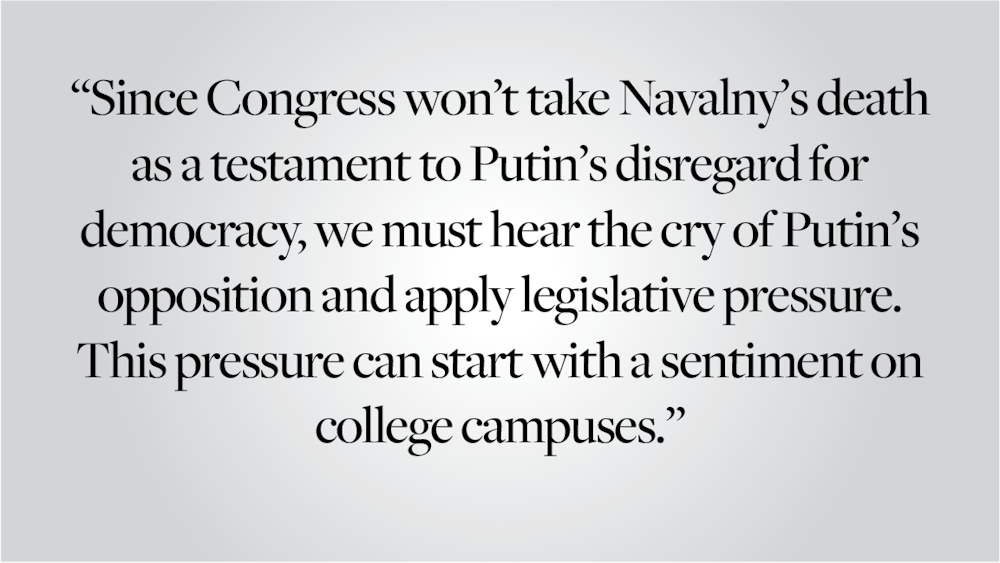While it seems that activism on college campuses has been at an all-time high, the death of Alexsei Navalny has not incited the outrage from students that it warrants. Whether this is rooted in an exhaustion of foreign geopolitical care or a disregard for the Russian opposition movement is irrelevant. No matter the cause of the unsettling quiet, college campuses must break the silence with an uproar, demanding the House to act swiftly and vote in favor of sending foreign aid to Ukraine.
Navalny represented hope for an alternative to Putin’s presidency. His work in political activism included anti-corruption advocacy and civil rights protections. However, in 2017, as he grew in popularity and threatened Putin’s dominance, he was barred from the 2018 Russian presidential election. His death represents the crushing of hope for an interjection of democracy in Russian politics and a change of the current regime.
Navalny’s “sudden death syndrome” on Feb. 16 in prison inspired a moment of dissent in Russia. Thousands poured from the church in which his funeral service was held, Navalny's followers making an impressive showing despite Kremlin threats of arrest. As it is apparent that Putin is responsible for Navalny’s precarious death, the dictator has marked a new low in his ruthless pursuit of power.
The unity shown at Navalny’s funeral has also appeared in the US with vigils and a memorial outside of the Russian consulate. Yet, despite the global reckoning of Putin’s transgression, college campuses remain complacent in their indifference. Even as Speaker of the House Mike Johnson sets to derail the Senate-passed aid for Ukraine, students across the country can’t seem to muster a moment of lament, nonetheless alarm.
Three days before Aleksei Navalny died, the Senate passed a $95.3 billion foreign aid bill that included $60 billion to support Ukraine’s resistance to Russia’s invasion. This came a week after Republicans blocked a similar bill that included a bipartisan border deal. The border provisions that were included at the request of Republicans were rejected following loaded attacks from Trump that claimed the provisions were lackluster.
Republicans are delaying the deliverance of aid to Ukraine, putting their political agendas above the imperative of Ukraine’s resistance to the Russian invasion. It is clear that Trump used his influence to kill the bill to leave room for him to campaign on the issue in the coming months. And now, Johnson has shown no intention of allowing the Senate-passed bill to move to the House floor for a vote. Johnson’s mind was not swayed by Putin’s commitment to authoritarianism in his killing of Navalny nor by pleas made by Senate Majority Leader Chuck Schumer.
The political motives of Republicans, which are currently delaying American aid, could be lethal and lead to Ukraine’s defeat. Putin’s tyranny and Johnson’s malfeasance must qualify as an issue worthy of the attention of college campuses, yet it seems many have simply moved on from Ukraine’s plight.
Since Congress won’t take Navalny’s death as a testament to Putin’s disregard for democracy, we must hear the cry of Putin’s opposition and apply pressure on Congress to act swiftly. This pressure can start on college campuses. If students are reinvigorated by Navalny’s martyrdom, we can inspire a national attitude that will not stand for Congress’s waffling and that demands geopolitical repercussions for Putin go beyond Biden’s sanctions.
College campuses must hear the echoes of Navalny’s cry and embody his dedication to democracy. If there ever has been a time to care about Ukraine, that time is now.
Paul Hudes ’27 can be reached at paul_hudes@brown.edu. Please send responses to this opinion to letters@browndailyherald.com and other op-eds to opinions@browndailyherald.com.
Paul Hudes is a staff columnist and a member of the editorial page board for the Brown Daily Herald. His column is wide-ranging but focuses mostly on American politics. Paul studies Applied Math Economics and English Literature.





